Helena Halme's Blog, page 41
May 5, 2013
Dr Glas in London
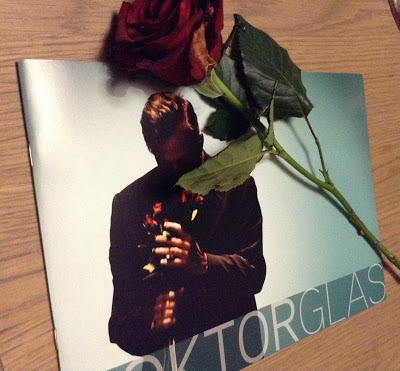
I'd been looking forward to seeing this dark Swedish play by Hjalmar Söderberg since I interviewed Krister Henriksson in London last autumn. Henriksson, who is better known to UK audiences for starring in the Swedish detective series as the morose Wallander, has been playing Dr Glas to great acclaim and full houses all over the Nordic countries. This is the first time Dr Glas has been performed in London, what's more, probably the first time any play has been staged in the West End in Swedish with English surtitles.
In whichever language, Dr Glas will attract Nordic Noir lovers. The play, written in 1905, deals with issues such as sex, adultery, murder and abortion. It's a one man show with no interval and very little in the way of props. The only noticeable difference in the set occurs, as moving from one act to another, the background colour changes from green, red to blue. All very minimalistic and very Nordic.
The villain in the story, Pastor Gregorius, is loathsome and morally repulsive. He has a beautiful wife, who in despair seeks the help of the lonely, but passionate physician, Dr Glas. The story is told in the form of a journal, which Dr Glas himself recounts. Immediately, however, the audience is aware that he may be an unreliable narrator; he says he won't tells us everything, but the bits he'll tell us are true.
In narrating the story, Krister Henriksson excels. He becomes the characters he, as Dr Glas, describes. Expertly, he contrasts the disgusting figure of the hypocritical clergyman with the beautiful, fragile Mrs Gregorius. Even a minor character such as the Doctor's journalist friend, is skilfully portrayed by Henriksson. It's as if the other characters were on stage with Henriksson.
As for Dr Glas himself, Henriksson becomes the sad, obsessed man, destined to seek unrequited love. The doctor's terrible moral dilemma, the deep love he feels for Mrs Gregorius and his desire to be a hero, seep out of Henriksson's every pore.
I am, however, in two minds about the surtitles. In operas they work well, because they are just a guide to what's being sung, rather than a simultaneous translation of the actors words. On one hand it's fantastic that a UK audience can enjoy the talent of a Swedish actor such as Henriksson live on a stage, but, for me, as a Swedish speaker, the surtitles were a pain. They either lagged behind a little or were slightly ahead of the spoken word. This is natural; it's impossible to match a translation word for word in two languages (I should know). But the time lag meant that the audience reaction to any dramatic line was out of sync with Henriksson's words, and with my own reactions. So rather than aiding my pleasure of the play, they disrupted the suspense of my disbelief. It'd be interesting to find out how an English speaker found the experience of the surtitles. Did they detract from the dramatic action on stage, I wonder?
Having said all that, if you love Nordic Noir, I would very much recommend you see this rare treat of a truly authentic Swedish play in London. You may even be as lucky as I, and a few others in the audience, and catch one of the red roses Henriksson threw out at curtain call.
Henriksson is a charming gentleman to the end.
Dr Glas
Wyndham's Theatre
London
www.drglas.com
Tickets are from £37
Until 11 May 2013
Published on May 05, 2013 01:36
April 30, 2013
Happy May Day Eve!
Hauskaa Vappua!
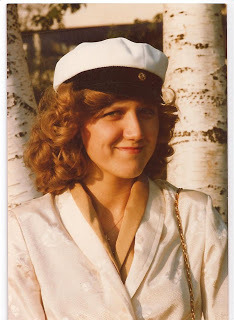
Happy May Day Eve! If you want to find out more about how us Nordics celebrate May Day, here are my earlier posts on the subject. Hope you have a great day, however you celebrate today (or on Monday when it's a Bank Holiday here in the UK)!

Happy May Day Eve! If you want to find out more about how us Nordics celebrate May Day, here are my earlier posts on the subject. Hope you have a great day, however you celebrate today (or on Monday when it's a Bank Holiday here in the UK)!
Published on April 30, 2013 04:54
April 26, 2013
A Weekend Reader Offer on Coffee and Vodka!
Coffee and Vodka, dubbed 'Nordic Noir Meets Family Saga' at The London Book Fair, is now on a very special and very limited offer. From today until Sunday (26-28 April 2013) you can download my book for only £1.35 (or $1.99).
Here are more details and links to where you can download the book.
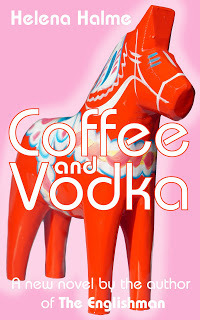
Now Only $1.99 Was $4.99Offer Ends Sunday 28th April 13Buy it Now:
Amazon iBooks Kobo Nook
Readers give Coffee and Vodka ***** stars
"Compelling Narrative" "Fabulous reading"
Nordic Noir meets family saga in this heartfelt story of immigration and family breakup set in Finland and Sweden.
'In Stockholm everything is bigger and better'. 11-year-old Eeva is excited when Pappa decides her family will emigrate to Sweden from Finland. But adjusting to a new language and culture is not as easy as Pappa thought. Thirty years later, when Eeva returns to her home town of Tampere to see her dying grandmother, she is forced relive the dramatic events of her childhood.
Some prices may change wthout notice, so please make sure to confirm the offer before downloading.
Have a nice weekend and happy reading! The sun has come out again in London….(for a brief moment at least).
Here are more details and links to where you can download the book.

Now Only $1.99 Was $4.99Offer Ends Sunday 28th April 13Buy it Now:
Amazon iBooks Kobo Nook
Readers give Coffee and Vodka ***** stars
"Compelling Narrative" "Fabulous reading"
Nordic Noir meets family saga in this heartfelt story of immigration and family breakup set in Finland and Sweden.
'In Stockholm everything is bigger and better'. 11-year-old Eeva is excited when Pappa decides her family will emigrate to Sweden from Finland. But adjusting to a new language and culture is not as easy as Pappa thought. Thirty years later, when Eeva returns to her home town of Tampere to see her dying grandmother, she is forced relive the dramatic events of her childhood.
Some prices may change wthout notice, so please make sure to confirm the offer before downloading.
Have a nice weekend and happy reading! The sun has come out again in London….(for a brief moment at least).
Published on April 26, 2013 07:30
April 22, 2013
Emirates Air Line in London
As some of you may know it was my birthday on Saturday, and to celebrate it, (after lunch with family, of course) The Englishman decided to ignore (!) his fear of heights and take me on the cable car which crosses the Thames. Since it opened for the London Olympics last year, The Emirates cable car has been criticised for being expensive, and for going 'from nowhere to nowhere'. Papers like The Standard have also been writing that no-one ever goes on it.
Well, on Saturday there was a queue! After waiting for about 20 minutes in the sunny but windy quayside, we paid our £3.20 fare on our Oyster cards and got onboard. (I didn't think that was too bad a price).
Once inside it felt a bit as if a ski lift had been put in the wrong place. I must admit that while the Englishman had been apprehensive, I felt real fear once the glass cubicle began to climb up into the air. Somehow a ski lift seems safer - or perhaps on a Nordic skiing holiday I have more adrenalin flowing through my veins?
The views were fantastic, though, especially on such a sunny day. Below us the river snaked towards the sea, with the Thames Barriers to the East and The Millennium Dome - or O2 as it's now called - to the West. In the distance, the glass fronted skyscrapers of Canary Wharf glinted in sun.
In the end The Englishman wasn't at all bothered about the height. Typical, when he's OK, I'm not...It wasn't as if I didn't enjoy the ride, but I was mighty glad to be back on Terra firma and later on a river boat going back into town.
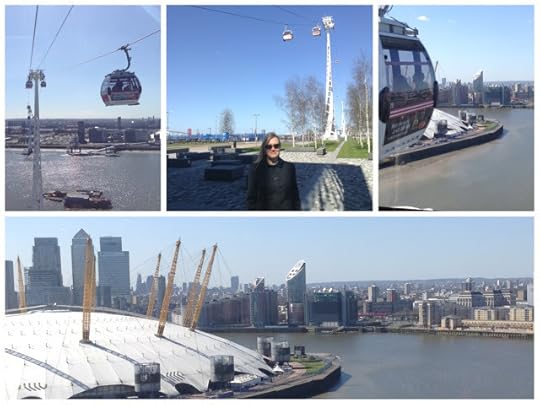
Well, on Saturday there was a queue! After waiting for about 20 minutes in the sunny but windy quayside, we paid our £3.20 fare on our Oyster cards and got onboard. (I didn't think that was too bad a price).
Once inside it felt a bit as if a ski lift had been put in the wrong place. I must admit that while the Englishman had been apprehensive, I felt real fear once the glass cubicle began to climb up into the air. Somehow a ski lift seems safer - or perhaps on a Nordic skiing holiday I have more adrenalin flowing through my veins?
The views were fantastic, though, especially on such a sunny day. Below us the river snaked towards the sea, with the Thames Barriers to the East and The Millennium Dome - or O2 as it's now called - to the West. In the distance, the glass fronted skyscrapers of Canary Wharf glinted in sun.
In the end The Englishman wasn't at all bothered about the height. Typical, when he's OK, I'm not...It wasn't as if I didn't enjoy the ride, but I was mighty glad to be back on Terra firma and later on a river boat going back into town.

Published on April 22, 2013 04:45
April 18, 2013
5 Reasons Why an Author Should Visit The London Book Fair
Many people ask me why on earth I attend The London Book Fair. Here are five reasons I always try to make the Fair:
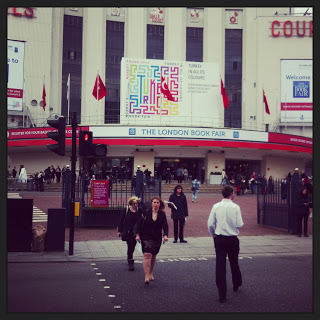
1. To learn. During this year's London Book Fair I attended over ten seminars, and although not all of them were right for me, the majority taught me something new. I will write about specific subjects under another post, but for example in AuthorLounge on Tuesday (16 April 13), two industry giants, Pottermore CEO Charlie Redmayne and Eric Huang, Director New Business and IP Acquisitions at Penguin, gave an interesting and informative talk about how books are changing with additional digital content. Apps, games and toys are all part and parcel of the digital future for books. I came away excited about the future, rather than fearful.
2. To network. Each year, sometimes by pure accident, I meet someone who is interesting and who I can exchange views and keep in touch after the Fair. This year, because of the wonderful Alliance of Independent Authors, I met many like-minded writers. I also got two definite promises of book reviews from influential people. And I got to pitch to an agent who asked me to send my book to him. (I've been here before, still it was great to have affirmation from someone in the traditional industry that my writing pitching is on the right track).
3. To make friends. This year particularly, I really feel I've made some true friends. Having all the fellow ALLi members there has been such a huge support. Thank you Orna Ross for making it happen! Thanks must also go to AuthorRight who provided us with the AuthorLounge seminar area - and drinks at the end of each day! (VERY important). Gareth Howard was a tireless host - I wonder if he slept at all during the three days? Not forgetting the giant Amazon who hosted the ALLi 1st Birthday Party on Monday. What a coup!
4. To sell your books. Here planning is key. Making appointments with agents and publishers at LBF is notoriously difficult, but it does happen. However, even if you haven't planned ahead, just your presence at the Fair, talking about your book and asking other writers about theirs will provide results. As Joanna Penn from The Creative Penn says, reviews sell your books, and talking about your book(s) will gain you those. You are the best salesperson for your books, so be yourself and talk about your work.
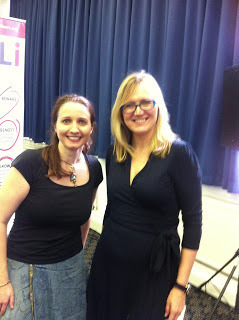 Me with Joanna Penn5. To see the bigger picture. I always remember the first time I entered the hall and was surprised by how many segments the industry was made of. The vast space at Earls Court is divided into areas by genre, from the academic press to children's literature, as well as industry segments from international focus (like Finnish Literature Exchange, FILI), the digital zone, to a few second hand booksellers. In the middle are the grand stands (some with staircases to bars) of the major publishers like Hachette (below), while the smaller boxes of the independent presses and second-hand booksellers line the walls, with perhaps a chair or two around a lonely table.
Me with Joanna Penn5. To see the bigger picture. I always remember the first time I entered the hall and was surprised by how many segments the industry was made of. The vast space at Earls Court is divided into areas by genre, from the academic press to children's literature, as well as industry segments from international focus (like Finnish Literature Exchange, FILI), the digital zone, to a few second hand booksellers. In the middle are the grand stands (some with staircases to bars) of the major publishers like Hachette (below), while the smaller boxes of the independent presses and second-hand booksellers line the walls, with perhaps a chair or two around a lonely table.
 I took this picture at the end of the
I took this picture at the end of the
last day - during the show this space was filled with literary folk having meetings.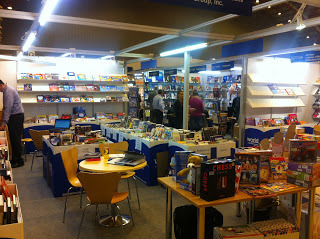 One of the larger second hand booksellers at LBF13. Nice to see!
One of the larger second hand booksellers at LBF13. Nice to see!
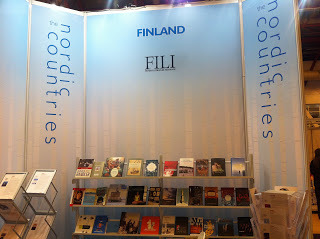 Finland was represented by FILI in the Nordic countries stand.
Finland was represented by FILI in the Nordic countries stand.
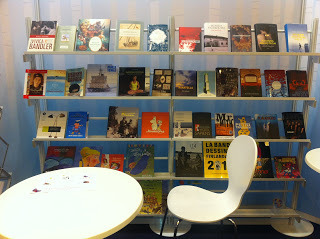 Inside the Finnish FILI stand.This year there was a definite change in the air at the Fair. There was a rumour going around (I heard it from Rohan Quine ) that the International Rights Centre upstairs was a bit quiet and that all the action was downstairs. There certainly was a huge buzz around AuthorLounge (and no, it wasn't just the bar). Most of the time it wasn't possible to get inside to listen to the seminars, let alone get a seat.
Inside the Finnish FILI stand.This year there was a definite change in the air at the Fair. There was a rumour going around (I heard it from Rohan Quine ) that the International Rights Centre upstairs was a bit quiet and that all the action was downstairs. There certainly was a huge buzz around AuthorLounge (and no, it wasn't just the bar). Most of the time it wasn't possible to get inside to listen to the seminars, let alone get a seat.
So, if you are an author, or an aspiring writer, try to make it to The London Book Fair next year. It inspires, it makes good business sense and it's fun!

1. To learn. During this year's London Book Fair I attended over ten seminars, and although not all of them were right for me, the majority taught me something new. I will write about specific subjects under another post, but for example in AuthorLounge on Tuesday (16 April 13), two industry giants, Pottermore CEO Charlie Redmayne and Eric Huang, Director New Business and IP Acquisitions at Penguin, gave an interesting and informative talk about how books are changing with additional digital content. Apps, games and toys are all part and parcel of the digital future for books. I came away excited about the future, rather than fearful.
2. To network. Each year, sometimes by pure accident, I meet someone who is interesting and who I can exchange views and keep in touch after the Fair. This year, because of the wonderful Alliance of Independent Authors, I met many like-minded writers. I also got two definite promises of book reviews from influential people. And I got to pitch to an agent who asked me to send my book to him. (I've been here before, still it was great to have affirmation from someone in the traditional industry that my writing pitching is on the right track).
3. To make friends. This year particularly, I really feel I've made some true friends. Having all the fellow ALLi members there has been such a huge support. Thank you Orna Ross for making it happen! Thanks must also go to AuthorRight who provided us with the AuthorLounge seminar area - and drinks at the end of each day! (VERY important). Gareth Howard was a tireless host - I wonder if he slept at all during the three days? Not forgetting the giant Amazon who hosted the ALLi 1st Birthday Party on Monday. What a coup!
4. To sell your books. Here planning is key. Making appointments with agents and publishers at LBF is notoriously difficult, but it does happen. However, even if you haven't planned ahead, just your presence at the Fair, talking about your book and asking other writers about theirs will provide results. As Joanna Penn from The Creative Penn says, reviews sell your books, and talking about your book(s) will gain you those. You are the best salesperson for your books, so be yourself and talk about your work.
 Me with Joanna Penn5. To see the bigger picture. I always remember the first time I entered the hall and was surprised by how many segments the industry was made of. The vast space at Earls Court is divided into areas by genre, from the academic press to children's literature, as well as industry segments from international focus (like Finnish Literature Exchange, FILI), the digital zone, to a few second hand booksellers. In the middle are the grand stands (some with staircases to bars) of the major publishers like Hachette (below), while the smaller boxes of the independent presses and second-hand booksellers line the walls, with perhaps a chair or two around a lonely table.
Me with Joanna Penn5. To see the bigger picture. I always remember the first time I entered the hall and was surprised by how many segments the industry was made of. The vast space at Earls Court is divided into areas by genre, from the academic press to children's literature, as well as industry segments from international focus (like Finnish Literature Exchange, FILI), the digital zone, to a few second hand booksellers. In the middle are the grand stands (some with staircases to bars) of the major publishers like Hachette (below), while the smaller boxes of the independent presses and second-hand booksellers line the walls, with perhaps a chair or two around a lonely table. I took this picture at the end of the
I took this picture at the end of the last day - during the show this space was filled with literary folk having meetings.
 One of the larger second hand booksellers at LBF13. Nice to see!
One of the larger second hand booksellers at LBF13. Nice to see!
 Finland was represented by FILI in the Nordic countries stand.
Finland was represented by FILI in the Nordic countries stand.
 Inside the Finnish FILI stand.This year there was a definite change in the air at the Fair. There was a rumour going around (I heard it from Rohan Quine ) that the International Rights Centre upstairs was a bit quiet and that all the action was downstairs. There certainly was a huge buzz around AuthorLounge (and no, it wasn't just the bar). Most of the time it wasn't possible to get inside to listen to the seminars, let alone get a seat.
Inside the Finnish FILI stand.This year there was a definite change in the air at the Fair. There was a rumour going around (I heard it from Rohan Quine ) that the International Rights Centre upstairs was a bit quiet and that all the action was downstairs. There certainly was a huge buzz around AuthorLounge (and no, it wasn't just the bar). Most of the time it wasn't possible to get inside to listen to the seminars, let alone get a seat.So, if you are an author, or an aspiring writer, try to make it to The London Book Fair next year. It inspires, it makes good business sense and it's fun!
Published on April 18, 2013 04:54
April 17, 2013
A-Z Blogging Challenge: O is for Overdoing it….
Oh dear, I think I rather tried to overdo it this month…

Not only is April the month of two important birthdays in our household, it is also the month of The London Book Fair, so when you honestly think about it, trying to also blog every day was a little bit overambitious. Welcome to my world!
So I'm afraid I will have to accept defeat (not an easy task). Please can all of you lovely A-Z Bloggers, accept my apologies for a spectacular A-Z Fail. I promise to do it another time (as long as it doesn't co-incide with LBF).
Look out for several post here about the Fair in the coming days. I know its no consolation, but it's something..? I will also not forget to post about MA in Creative Writing, something I was meant to do a few days ago under M.

Not only is April the month of two important birthdays in our household, it is also the month of The London Book Fair, so when you honestly think about it, trying to also blog every day was a little bit overambitious. Welcome to my world!
So I'm afraid I will have to accept defeat (not an easy task). Please can all of you lovely A-Z Bloggers, accept my apologies for a spectacular A-Z Fail. I promise to do it another time (as long as it doesn't co-incide with LBF).
Look out for several post here about the Fair in the coming days. I know its no consolation, but it's something..? I will also not forget to post about MA in Creative Writing, something I was meant to do a few days ago under M.
Published on April 17, 2013 03:42
April 14, 2013
A-Z Blogging Challenge: L is London Book Fair
My theme: Writing and the business of writing
I remember when I first came up from the country to the London Book Fair about five years ago, and was struck by how business-like and un-literary the whole event was. And how lacking in writers something calling itself a Book Fair could be. Plus the agents were nowhere to be seen; they were tucked away in the International Rights Centre upstairs, which wasn't accessible unless you had an appointment. I was reminded of the New York Stock Exchange, where huge amounts of money were being moved but where not a dime nor a nickel was ever to be seen.
But, to reflect the rest of the publishing industry, even the London Book Fair is changing. These days there's something called Author Lounge, with several events aimed at writers. Of course majority of these are companies selling digital publication and printing solutions to writers, biggest one being Amazon's KDP, but there are also many seminars aimed to help us Indy writers produce and sell our books.
Alliance of Independent Writers (ALLi) is organising a series of events, including Kobo book presentations by ALLi authors, and a talks by Orna Ross and Joanna Penn on self-publishing. And there's going to be ALLi's 1st birthday party too! (I can't wait!)
So, this year at the LFB, I will be a busy little bee, attending seminars, meeting many other ALLi authors. I even have a pitching slot with an agent. Wish me luck, I'll be on around two o'clock tomorrow!
I will attempt some live blogging from LBF, so watch this space.
London Book Fair, Earls Court, London 14-17 April 2013
I remember when I first came up from the country to the London Book Fair about five years ago, and was struck by how business-like and un-literary the whole event was. And how lacking in writers something calling itself a Book Fair could be. Plus the agents were nowhere to be seen; they were tucked away in the International Rights Centre upstairs, which wasn't accessible unless you had an appointment. I was reminded of the New York Stock Exchange, where huge amounts of money were being moved but where not a dime nor a nickel was ever to be seen.
But, to reflect the rest of the publishing industry, even the London Book Fair is changing. These days there's something called Author Lounge, with several events aimed at writers. Of course majority of these are companies selling digital publication and printing solutions to writers, biggest one being Amazon's KDP, but there are also many seminars aimed to help us Indy writers produce and sell our books.
Alliance of Independent Writers (ALLi) is organising a series of events, including Kobo book presentations by ALLi authors, and a talks by Orna Ross and Joanna Penn on self-publishing. And there's going to be ALLi's 1st birthday party too! (I can't wait!)
So, this year at the LFB, I will be a busy little bee, attending seminars, meeting many other ALLi authors. I even have a pitching slot with an agent. Wish me luck, I'll be on around two o'clock tomorrow!
I will attempt some live blogging from LBF, so watch this space.
London Book Fair, Earls Court, London 14-17 April 2013
Published on April 14, 2013 14:36
April 12, 2013
A-Z Challenge: K is for Karelia
My theme: writing and the business of writing
"Karelia: a region of NE Europe, formerly Finland but annexed in several stages by the former Soviet Union."
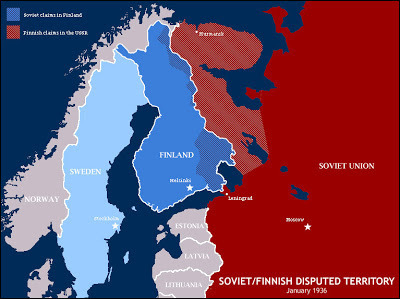 Picture from Paradox
Picture from Paradox
In Finnish history, Karelia is a contentious issue. It's not mentioned in the above quote, (from Collins dictionary 2003) but Finland still has a region called Karelia. Many Karelian Finns also consider the area now belonging to Russia as their rightful homeland, because during the 2nd World War many people lost their land and property during bitter battles fought between Finns and Russians.
What has Karelia got to do with writing?
For a writer, historically dramatic events and regions are important, and you ignore them at your peril. Even if your book is set in modern times, there are always characters whose lives, or whose relatives' lives, have been affected by a historical event. This is true especially for Finland, whose short history has seen many wars and tragedies.
In my latest spy novel, The Red King of Helsinki, the main protagonist's Karelian family lost their home in the Winter War. This tragedy has repercussions when Pia's mother Maija decides to study the Russian language in the 1950's.
Maija’s degree in Russian language had always been a problem. First her mother was against it. Maija’s grandfather fought the Reds in the Civil War in 1917, and her father the Russians twenty-five years later in the Winter War. His family were from Karelia.
Maija’s aunt talked often about the two evacuations from Karelia, where 400,000 had to leave their homes and livelihoods. Her home as well as the childhood home was near Viipuri, now beyond the border in the Soviet Union. Auntie Eija's husband had died in the war; how, Maija wasn’t ever quite sure. She had visions of Uncle Kaarlo in a fist fight with a tall Russian while their large farmhouse with beautifully carved porches was in flames in the background. Aunt Eija carried pictures of the farmhouse they had lost as well as a black-and-white portrait of her dead husband in her purse. She never passed an opportunity to take the pictures out and decry the Soviet state.
‘We lost our homeland, but Finland kept her independence, unlike those poor Baltic states.’
Even though I don't have any close family connections with Karelia, I've always been fascinated by the Karelian people and its history, which has so coloured Finnish life. I guess that's why Karelian characters often seep into my fiction.
The Red King of Helsinki came out 30 March is now available on Kindle as well as iBooks and other e-reading devices.
"Karelia: a region of NE Europe, formerly Finland but annexed in several stages by the former Soviet Union."
 Picture from Paradox
Picture from Paradox
In Finnish history, Karelia is a contentious issue. It's not mentioned in the above quote, (from Collins dictionary 2003) but Finland still has a region called Karelia. Many Karelian Finns also consider the area now belonging to Russia as their rightful homeland, because during the 2nd World War many people lost their land and property during bitter battles fought between Finns and Russians.
What has Karelia got to do with writing?
For a writer, historically dramatic events and regions are important, and you ignore them at your peril. Even if your book is set in modern times, there are always characters whose lives, or whose relatives' lives, have been affected by a historical event. This is true especially for Finland, whose short history has seen many wars and tragedies.
In my latest spy novel, The Red King of Helsinki, the main protagonist's Karelian family lost their home in the Winter War. This tragedy has repercussions when Pia's mother Maija decides to study the Russian language in the 1950's.
Maija’s degree in Russian language had always been a problem. First her mother was against it. Maija’s grandfather fought the Reds in the Civil War in 1917, and her father the Russians twenty-five years later in the Winter War. His family were from Karelia.
Maija’s aunt talked often about the two evacuations from Karelia, where 400,000 had to leave their homes and livelihoods. Her home as well as the childhood home was near Viipuri, now beyond the border in the Soviet Union. Auntie Eija's husband had died in the war; how, Maija wasn’t ever quite sure. She had visions of Uncle Kaarlo in a fist fight with a tall Russian while their large farmhouse with beautifully carved porches was in flames in the background. Aunt Eija carried pictures of the farmhouse they had lost as well as a black-and-white portrait of her dead husband in her purse. She never passed an opportunity to take the pictures out and decry the Soviet state.
‘We lost our homeland, but Finland kept her independence, unlike those poor Baltic states.’
Even though I don't have any close family connections with Karelia, I've always been fascinated by the Karelian people and its history, which has so coloured Finnish life. I guess that's why Karelian characters often seep into my fiction.
The Red King of Helsinki came out 30 March is now available on Kindle as well as iBooks and other e-reading devices.
Published on April 12, 2013 03:23
April 11, 2013
A-Z Blogging Challenge: I is for Independent Publishing
My theme: Writing and the business of writing.
[I know, I know, I'm running a day late again! Please be patient, I shall attempt to catch up soon.]
Before the ebook revolution, the only route writers (like me) had for getting their work published was through an agent and a publisher. If your book sold a certain amount of copies (I guess 1,000 would be a good number for a first book), the publisher would buy the author's next book. If the first book didn't sell well, the author would be dropped first by the publisher and then by the agent. (Unless the book won an award, in which case sales would be boosted anyway.) In a worst case scenario, a first novel might not even make enough money to cover the advance which the agent had negotiated for the author. If you happened to be that poor author, you'd pretty well know your career as a writer was over. No-one in the business would touch an author who'd lost a publisher money.
If a writer didn't want to go the traditional route (or had lost all hope after having received enough rejection letters to paper the walls of the office), there was an option to self-publish. This used to be called, rather nastily by the establishment, Vanity Publishing. There were a few presses who'd charge thousands of pounds / dollars, promise editorial and marketing support, and produce a (often an inferior looking) book. I'm sure there were some successful vanity books out there, but I wager that most of the copies produced ended up in the authors' garages and cellars.
When Kindle, iPads and other reading devices came onto the market, and Amazon et al established their publishing platforms, many authors realised they could get their books straight to readers with a much smaller investment. With Amazon and Smashwords, authors also got a larger share (up to 70%) of the book than with a traditional publisher. Suddenly self-publishing became Independent Publishing and authors began making money without the help of the 'old' establishment.
Finally last year, the success of 50 Shades of Grey really made the traditional publishers and agents take notice. They began to sign up authors who'd made money out of their ebooks. It's strange how a few spondoolies make people change their minds about something as unspeakable as Vanity Publishing?
Today more and more ebooks are being read and published. Digital book sales continue to grow rapidly each year, as does the number of Independent Authors who are making good money out of their writing. Some of these writers are declining offers from agents and publishing houses, preferring to remain in full control of their careers. They can decide what to write, how the cover looks, how much to charge for their books and how many titles to publish each year. At the same time they get to keep a larger proportion of their book sales.
If your books sell well, why would you need a second and third layer between you and your readers?
As the balance of power in the industry shifts, what happens to the writers? Are Independent Authors leaving themselves unprotected, since they're not receiving the technical and legal knowledge agents usually provide? Or the moral support they give their authors? Or are these just fabricated reasons to make money from an author?
There are now so-called 'hybrid' agents and publishers who take on just the physical book rights of an Indy Author, while the digital rights remain with the writer. This, as I discussed before in my post under agents, is the ideal situation; an almost 'eating your cake and having it' -scenario for a writer.
Many members of the one-year-old Alliance Independent Authors believe that the future is going to be very bright indeed. As the organisation grows, it also gains more power. In the various ALLi forums, there's talk of establishing a quality mark of some sort, as well as discussions on whether Indy Writers should be included in the annual awards circuit. At the moment independently published books do not qualify for literary awards like The Booker or The Costa.
I'm not sure I wish to write off agents and publishers quite yet. At the same time I am really, really enjoying being my own master. (See that fence?)
During next week's London Book Fair, ALLi Founder and Director, Orna Ross, is speaking at Digital Minds Conference and other LBF seminars, and an ALLi guide to publishing services is also going to be launched.
[I know, I know, I'm running a day late again! Please be patient, I shall attempt to catch up soon.]
Before the ebook revolution, the only route writers (like me) had for getting their work published was through an agent and a publisher. If your book sold a certain amount of copies (I guess 1,000 would be a good number for a first book), the publisher would buy the author's next book. If the first book didn't sell well, the author would be dropped first by the publisher and then by the agent. (Unless the book won an award, in which case sales would be boosted anyway.) In a worst case scenario, a first novel might not even make enough money to cover the advance which the agent had negotiated for the author. If you happened to be that poor author, you'd pretty well know your career as a writer was over. No-one in the business would touch an author who'd lost a publisher money.
If a writer didn't want to go the traditional route (or had lost all hope after having received enough rejection letters to paper the walls of the office), there was an option to self-publish. This used to be called, rather nastily by the establishment, Vanity Publishing. There were a few presses who'd charge thousands of pounds / dollars, promise editorial and marketing support, and produce a (often an inferior looking) book. I'm sure there were some successful vanity books out there, but I wager that most of the copies produced ended up in the authors' garages and cellars.
When Kindle, iPads and other reading devices came onto the market, and Amazon et al established their publishing platforms, many authors realised they could get their books straight to readers with a much smaller investment. With Amazon and Smashwords, authors also got a larger share (up to 70%) of the book than with a traditional publisher. Suddenly self-publishing became Independent Publishing and authors began making money without the help of the 'old' establishment.
Finally last year, the success of 50 Shades of Grey really made the traditional publishers and agents take notice. They began to sign up authors who'd made money out of their ebooks. It's strange how a few spondoolies make people change their minds about something as unspeakable as Vanity Publishing?
Today more and more ebooks are being read and published. Digital book sales continue to grow rapidly each year, as does the number of Independent Authors who are making good money out of their writing. Some of these writers are declining offers from agents and publishing houses, preferring to remain in full control of their careers. They can decide what to write, how the cover looks, how much to charge for their books and how many titles to publish each year. At the same time they get to keep a larger proportion of their book sales.
If your books sell well, why would you need a second and third layer between you and your readers?
As the balance of power in the industry shifts, what happens to the writers? Are Independent Authors leaving themselves unprotected, since they're not receiving the technical and legal knowledge agents usually provide? Or the moral support they give their authors? Or are these just fabricated reasons to make money from an author?
There are now so-called 'hybrid' agents and publishers who take on just the physical book rights of an Indy Author, while the digital rights remain with the writer. This, as I discussed before in my post under agents, is the ideal situation; an almost 'eating your cake and having it' -scenario for a writer.
Many members of the one-year-old Alliance Independent Authors believe that the future is going to be very bright indeed. As the organisation grows, it also gains more power. In the various ALLi forums, there's talk of establishing a quality mark of some sort, as well as discussions on whether Indy Writers should be included in the annual awards circuit. At the moment independently published books do not qualify for literary awards like The Booker or The Costa.
I'm not sure I wish to write off agents and publishers quite yet. At the same time I am really, really enjoying being my own master. (See that fence?)
During next week's London Book Fair, ALLi Founder and Director, Orna Ross, is speaking at Digital Minds Conference and other LBF seminars, and an ALLi guide to publishing services is also going to be launched.
Published on April 11, 2013 08:15
April 9, 2013
A-z Blogging Challenge: H is for Helsinki
My theme: Writing and the business of writing
What has Helsinki got to do with writing, I hear you scream. Well, OK, absolutely nothing, although, Helsinki is the setting for two of my books, and will be the setting for my next book too. (More about this later.)
I just thought today, about third way thoroughly this challenge, it's time for a pictorial post.
I wasn't born in Helsinki, so I can't claim to be 'bare footed' Hesalainen (I don't know why Helsinki born Finns are called 'bare footed', strange?). But, I was only 15 when we moved there, and I lived in Helsinki until I moved to the UK, so it's very much a home town for me.
I've also just booked tickets to go to Helsinki in May to do some research for the above mentioned book, so I thought these pictures I took last summer would be fitting. I hope you enjoy them!
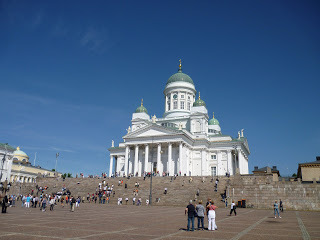
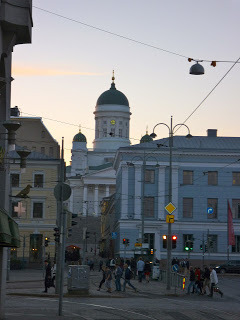
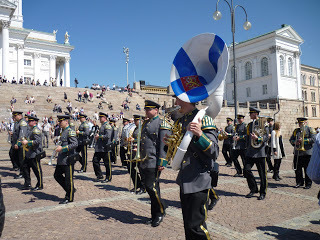

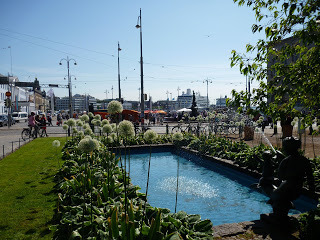
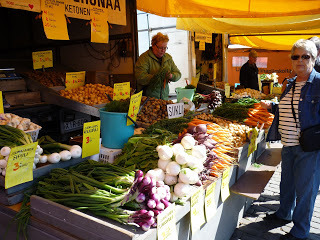
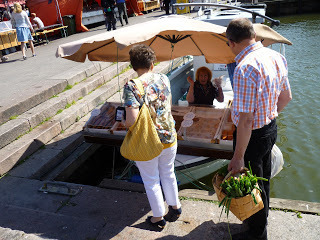
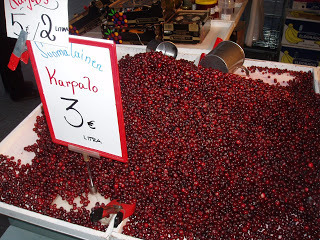
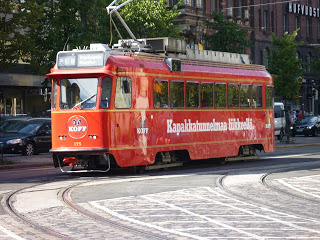
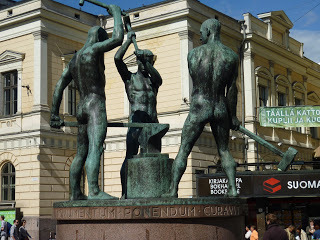
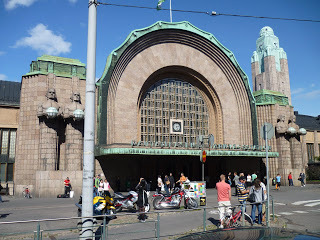

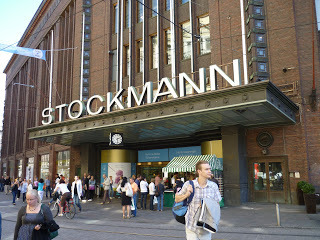
To learn more about Helsinki, go to Visit Helsinki.
What has Helsinki got to do with writing, I hear you scream. Well, OK, absolutely nothing, although, Helsinki is the setting for two of my books, and will be the setting for my next book too. (More about this later.)
I just thought today, about third way thoroughly this challenge, it's time for a pictorial post.
I wasn't born in Helsinki, so I can't claim to be 'bare footed' Hesalainen (I don't know why Helsinki born Finns are called 'bare footed', strange?). But, I was only 15 when we moved there, and I lived in Helsinki until I moved to the UK, so it's very much a home town for me.
I've also just booked tickets to go to Helsinki in May to do some research for the above mentioned book, so I thought these pictures I took last summer would be fitting. I hope you enjoy them!













To learn more about Helsinki, go to Visit Helsinki.
Published on April 09, 2013 00:23



